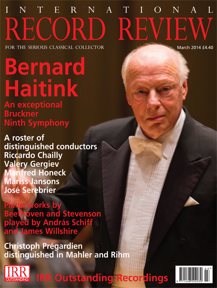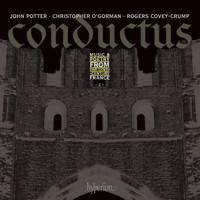Texte paru dans: / Appeared in: |
|
|
Reviewer: Robert
Levett This fascinating and beautiful release is the second in a three‑volurne series growing out of 'Canturn pulcriorem invenire: Thirteenth Century Music and Poetry' in a University of Southampton‑based project funded by the Arts and Humanities Research Council and led by Professor Mark Everist, whose extensive notes grace the accompanying booklets. Again, tenors John Porter, Christopher O'Gorman and Rogers Covey‑Crump are our guides through the mysterious realm of the Medieval conductus, that Ars antiqua genre of (mostly sacred) Latin song which flourished in Paris and elsewhere for nearly 100 years before being eclipsed by the motet in the second half of the thirteenth century.
I Say mostly, sacred, because among the themes and subjects treated by the poetry on this recording are (recent) history (Aurelianis civitas: the Orléans student riots of 1236) and the corruption of the papal court (Balla fulminante, Quid ultra tibi facere and Dic, Christi veritas). Other conducti here tend towards the Marian (the lovely Ave Maria Salus hominum) and moralistic (Veste nuptiali).
And again, the forms and textures vary: from mono‑ to multi‑stanzaic poetry, from syllabic to melismatic settings, from monophonic to polyphonic textures, from measured to unmeasured rhythms and from using the same music for each stanza to a more through‑composed approach. The French (Notre Dame) conducti are almost exclusively drawn from the so‑called Florence manuscript of the mid‑thirteenth‑century (it's housed in that city's Laurentian Library); three English conducti come from, as Everist describes it, ‘a highly fragmentary manuscript now in the library of Worcester College, Oxford'.
The programme is bookended by an unmeasured and a measured version of Bulla fulminante, bofh sung solo by Potter. Though his readings are wry and dramatic ‑ listen to the emphases on 'Distrabitur' ('Torn apart') and 'In spe vana plores ' ' ('You will weep in vain hope') ‑ the focus, here, as throughout, is on maximum clarity of diction and beauty of tone. Yet to hear the expansive three part texture and florid caudae (melismas) of Ave, virga decoris incliti which follows the first version is to feel oneself immediately released from all care. Other highlights n an impeccabIy performed and recorded programme include Potter's and O'Gorman's (mono‑stanzaic) Celorum porta, Covey‑Crump's powerful Quid ultra tibi facere, the spare sounding two‑part Ave, tuos benedic, with its extravagant attendant caudae, and the superb three‑part Die, Christi veritas, alive with dissonances, echoes and caudae.
|
|
|
|
|
|
Cliquez l'un ou l'autre
bouton pour découvrir bien d'autres critiques de CD |
|




